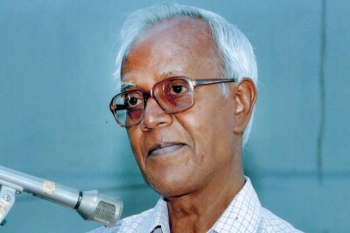
.jpg) Arockia Rayappan
Arockia Rayappan

Jon Sobrino SJ through his article, No Salvation Apart from the Poor, propounds a new locus to understand salvation in relation to a world of the poor. According to him, the poor have something in them for the salvation of today’s inhuman world. This would mean that salvation comes from the world of the unenlightened and the poor.
He challenges us to move beyond the question: ‘What must I do?’ to a stage where we become learners, receivers, and listeners by placing these Four Other Questions: 1) What can I know from the poor? 2) What can I hope for the poor? 3) What can I celebrate of the poor? 4) What can I receive from the poor? According to Sobrino’s New Logic, there is no life of peace without refugees, the homeless, the displaced, the migrants, and daily labourers. Even those who have nothing have something in them to offer for our salvation.
We are about to commemorate the second anniversary of the custodial martyrdom and institutionalized murder of Fr. Stan Swamy SJ on July 5. His life stands as the concretization of Sobrino’s new locus. Swamy believed that the Adivasis had salvation in them. Adivasis had something to contribute to our well-being.
We, citizens of India, could learn SOMETHING from the Adivasis as Swamy did. He identified himself with them so much that he called his place of ministry and service his Karma Bhoomi. We are well aware that his life of sacrifice is celebrated in the hearts and lives of the people in his Karma Bhoomi.
Here are some brief reflections on the life of Martyr Stan Swamy. Tony from New York, USA, says, “Father Swamy, in following his heart and acting in love towards the Adivasis, led a life of sacrifice. His fight for their lives and livelihood turned him into a martyr, bearing as an example for, at the very least, the Church of India, and its missionaries. One can notice this example and absorb it into our personal lives by doing whatever God asks of us and leads us to, and through, within our state of life, in order to grow exponentially in love within oneself and therefore reflect such an oscillating love towards our fellow global brothers and sisters in the Lord, and towards God.”
According to Father Dr. Kuruvilla Pandikattu, SJ, Pune, “Father Stan is a man of conviction, a man of God, and a man for the people. He lived and worked for the people, especially the tribals of Jharkhand. He paid the price for working for the poor and for standing with him. God will reward him. May we be inspired by his commitment, dedication, and concern for the poor, and marginalized sections of our own people. He was truly, totally, freely, lovingly, a Christian, a human being, and a man for others.”
Elaine LeBrun of Cornwall, Canada, shares her personal reflection thus: “I was touched by the life of this amazing man, Fr. Stan Swamy! He worked fearlessly and with great determination to carry out his mission to better the lives of the Adivasi and Dalit people despite the dangers he faced daily. His dedication, perseverance, and suffering in never giving up showed great courage as he battled the malignant conspiracy of Hindutva and the injustices to thousands of Adivasi and Dalit youth who were thrown in jail.”
Fr. Stan titled his autobiography as “I Am Not a Silent Spectator: Why Truth has become so bitter, Dissent so intolerable, Justice so out of reach.” Did he get to witness some of the fruit of his mission before he died? I hope so. Edwin Rodrigues, a fellow Jesuit of Swamy, professor of Vidyajyoti College of Theology and the editor of Vidyjyoti Journal of Theological Reflection, says, “For me, Stan Swamy is an excellent contextual theologian, championing the theology of the people of the grassroots. Stan walked in the footsteps of Jesus of Nazareth radically and went about doing good, preaching the Gospel of liberation to the poor and the oppressed. Taking inspiration from his exemplary life of utmost dedication even unto death, we, the Jesuits of South Asia, are committed to keep his legacy alive by standing for justice and working courageously and ceaselessly for peace and reconciliation in our polarized world.”
Martyr Stan Swamy inspires us to walk in the footsteps of Jesus and to find salvation in the poor by embracing daily deaths after the exemplary model of Jesus Christ our Lord and Master. Jesus' words continue to echo in my ears, my mind, and my heart as I write this article: “Are you able to drink the cup that I am about to drink?” (Matthew 20.22) and “If any want to become my followers, let them deny themselves and take up their cross daily and follow me” (Luke 9.23). May the echo of Jesus’ words find a reverberation in your ears, your mind, and your heart too.